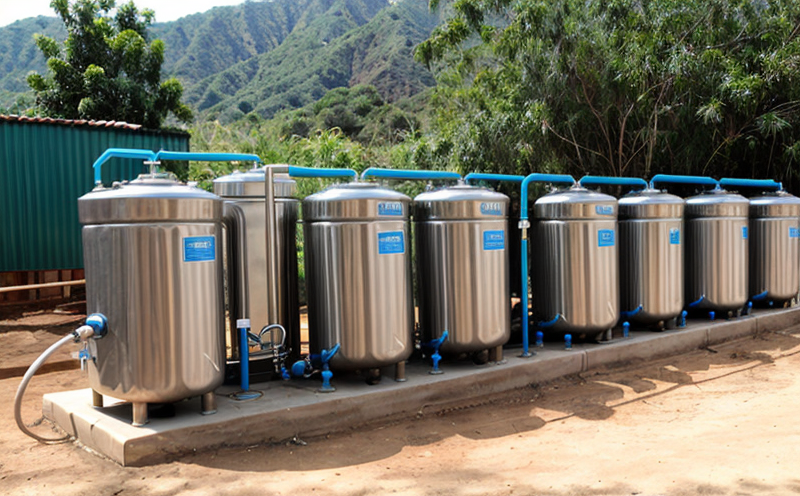APHA 4500 SO4 Sulfate Test in Effluent
The APHA (American Public Health Association) Method 4500 SO4 procedure is a widely recognized and standardized protocol used for the quantitative determination of sulfate in effluents. This test is critical in ensuring that wastewater treatment facilities comply with environmental regulations set forth by government agencies such as the U.S. Environmental Protection Agency (EPA) and other international bodies like ISO, ASTM, EN, IEC, etc.
Effluent from various industrial processes often contains high concentrations of sulfate ions due to the use of sulfuric acid or other compounds containing sulfur. In wastewater treatment plants, it is essential to monitor these levels because excess sulfate can lead to issues in downstream water treatment steps and affect the quality of treated effluent before discharge into natural ecosystems.
The APHA 4500 SO4 test involves several key steps: sample collection, preparation, digestion (if necessary), colorimetric reaction, and measurement using a spectrophotometer. The method relies on the reduction of excess sulfide to elemental sulfur by means of a thiosulfate-citrate-bromide buffer system followed by titration with potassium permanganate solution.
Accurate determination of sulfate concentration is crucial for several reasons:
- To ensure compliance with local and international environmental regulations,
- To maintain optimal performance of wastewater treatment processes,
- To prevent corrosion in pipelines and equipment,
- To protect aquatic life by minimizing the impact on receiving waters.
Failure to meet regulatory standards can result in substantial fines, reputational damage, and operational disruptions. Therefore, reliable testing methods like APHA 4500 SO4 are indispensable for maintaining compliance and ensuring safe discharges.
In summary, the APHA 4500 SO4 sulfate test is a vital tool in environmental monitoring, particularly when dealing with effluents from industrial sources. Its precision and reliability make it an essential component of any comprehensive wastewater analysis program.
Why It Matters
The significance of the APHA 4500 SO4 sulfate test extends beyond mere compliance; it plays a pivotal role in safeguarding public health, environmental integrity, and infrastructure longevity. By accurately measuring sulfate levels in effluent streams, this testing method helps prevent potential hazards associated with excessive sulfate concentrations.
Excess sulfate can lead to several adverse effects:
- Corrosion Risks: High sulfate content increases the likelihood of corrosion within pipes and tanks, leading to costly repairs and replacements.
- Treatment Efficiency: Excessive sulfate can interfere with biological processes in wastewater treatment plants, reducing overall efficiency.
- Ecosystem Impact: Discharge into water bodies rich in sulfate could disrupt aquatic ecosystems by altering pH levels or affecting flora and fauna adapted to specific chemical conditions.
- Health Concerns: While not typically a direct health risk from sulfate alone, ensuring proper treatment of industrial effluents is part of a broader strategy aimed at protecting human health indirectly through cleaner water supplies.
By adhering to stringent testing protocols such as APHA 4500 SO4, organizations demonstrate their commitment to responsible stewardship of natural resources and community well-being. This proactive approach not only fosters trust among stakeholders but also contributes positively towards sustainable development goals.
Eurolab Advantages
At Eurolab, we pride ourselves on offering unparalleled expertise in environmental testing services, including the APHA 4500 SO4 sulfate test for effluent samples. Our commitment to quality and innovation sets us apart from other laboratories:
- Accurate Results: Leveraging state-of-the-art instrumentation and experienced technicians ensures that every measurement is precise and reliable.
- Comprehensive Support: From initial consultation through final report delivery, our team provides full support to meet all your testing needs.
- Regulatory Compliance: Our methods align closely with international standards like ISO, ASTM, EN, IEC, etc., ensuring that you stay current with changing regulations.
- Efficient Turnaround Time: We understand the importance of timely results and strive to deliver reports within specified deadlines without compromising accuracy.
- Custom Solutions: For unique or complex samples, our laboratory offers tailored testing packages to address specific challenges faced by your organization.
- Continuous Improvement: Eurolab invests heavily in research and development to stay at the forefront of analytical techniques, ensuring that we consistently provide cutting-edge services.
- Digital Reporting: Utilizing advanced software solutions allows for seamless data management and easy access to results via secure online portals.
Partnering with Eurolab means accessing world-class facilities combined with a team dedicated to excellence, delivering peace of mind regarding your environmental testing requirements.





